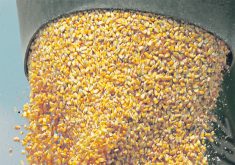Flax containing CDC Triffid must be kept out of the commercial handling system, but markets will exist for the contaminated crop.
The Flax Council of Canada announced Nov. 6 that all flax seed must be tested to see if it contains Triffid, the genetically modified variety that has been found in shipments to the European Union, resulting in stalled trade.
Grain companies have set a target date of
Dec. 1 to accept only tested flax.
Canada and Europe worked out a protocol of testing and documentation in late October to allow the resumption of Triffid-free flax trade.
Read Also

New wheat varieties offer Prairie farmers jump in yield
Three experimental wheat varieties developed by Agriculture Canada are showing yield increases of eight to 15 per cent over AAC Brandon wheat in registration trials.
Flax council president Barry Hall said Quantum Genetics Lab in Saskatoon is the first facility validated to do the work.
Producers will need to gather a representative sample of their flax and send it to Quantum Genetics. A form that should be attached to the samples will soon be available on the flax council’s website at www.flaxcouncil.ca and from grain companies. The council recommended that producers send the sample to Quantum by courier.
Hall said there is no reason for farmers to panic if a sample tests positive.
“If their flax does test positive for Triffid, there are markets that will take this,” he said.
“We need every effort to get this out of the system so that this never happens to us again.”
He said the industry will make every effort to find markets for flax with Triffid content.
“Best endeavours will be made by all handlers, merchandisers and shippers of Canadian flax to maintain full value for growers who own seed which contains varying levels of CDC Triffid,” the council said in a statement to farmers.
“Based upon current information, the industry is confident that such seed can be traded at values close to the prevailing market values.”
Hall said much effort has gone into the protocol designed to reestablish trade of Triffid-free flax to the EU. Its success depends on farmers co-operating with the handling and marketing sectors.
“They want to do everything possible in a positive manner to bring that material out and get it into a market that won’t penalize (the farmer).”
Triffid passed all the tests required for variety registration and use in Canada, but Europe will not accept it because the variety did not go through its system.
It was never presented for European testing because it was withdrawn from production on the assumption that GM-leery European users would not buy it.














